If you are buying your home, you should not waste the opportunity to buy a good investment. Yeah, your own home might not be considered as an investment that earns money, but let me explain how it can be, down the road.
First, here’s a little backgrounder. I remember a lot of comments from readers and also from people I meet in person who tell me that “We are just looking for a place to live and are not really interested with investing in real estate.”
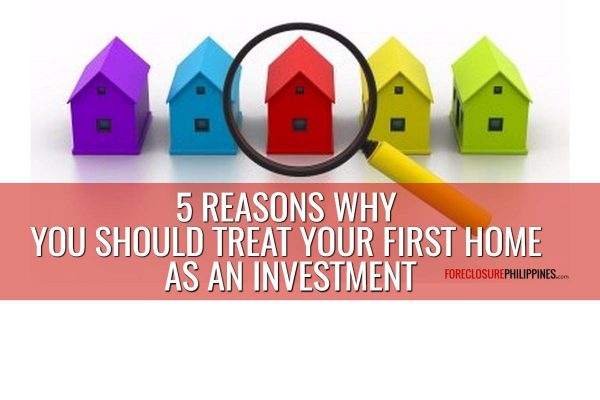
My default answer is “Why not treat your first home as an investment?”. Let me enumerate the reasons below.
1. In reality, once you buy a property, you become a real estate investor
Before anything else, let me say upfront that buying a home is often considered to be the biggest investment one can make, so like it or not, you become a real estate investor when you buy a property. If so, then it’s best to treat it as a real investment — one which will give you reasonable returns if and when you do decide to turn it into a rental property or flip it down the road.
2. It can provide reasonable returns
Normally, when a person buys a house which he intends to live in, he does not consider how much rent he would earn if he decides to rent the property out, and whether the possible rental income would be more than his monthly amortization and other expenses.
With that said, It is also common for a homeowner who moves up the corporate ladder or improves his situation, to move to a better home, but keep his first home for sentimental reasons.
Thus, if in the future, the homeowner decides to move to another house and converts his first house into a rental property, the rentals are often not enough to cover the monthly amortizations and other costs, thereby producing a negative cashflow situation.
Had the homeowner considered his first house as a real investment, he could have dedicated more time to finding a property that would fetch better rental rates which could cover the monthly amortizations and other expenses, thus giving the owner a nice positive cashflow.
More often than not, factors that may affect market values and appreciation are not given too much attention by a home buyer as the primary goal is just to have a place to live in. When the time comes to sell the property, it is very likely that there is little or no room for significant profits or capital gains.
At times, the homeowner may even have to sell at a loss. This situation could have been avoided had the home owner considered buying a property that was way below market value*.
*-“Market Value” is the estimated amount for which a property should exchange on the date of valuation between a willing buyer and a willing seller in an arm’s-length transaction after proper marketing wherein the parties had each acted knowledgeably, prudently, and without compulsion.
Buying a property below market value would be in alignment with what Robert Kiyosaki often says which is “You should make money when you buy, not when you sell”. Money is made in the form of equity* at the time the property is bought and the profit is realized when the property is sold. Robert Kiyosaki is the bestselling author of Rich Dad Poor Dad.
*- Equity is the difference between a property’s current appraised value or market value and the loan principal balance
So the reasonable returns I am talking about are in the form of cashflow or capital gains.
3. Don’t waste the opportunity to learn how to invest
Everyone at one point or another will really have to buy his or her own home so why not make the most out of the opportunity to learn how to invest in real estate and find a good investment property?!
If done well, one could get passive income in the form of positive cashflow, or significant profits if you flip the property, or both.
At the very least, the education one can gain from treating his first home as a real estate investment is priceless.
4. It is virtually risk-free
Since the primary goal of the home buyer is to have a place to live in, he would not really be concerned with holding costs associated with properties that take time to lease or sell. He/she lives in the place anyway so this makes it virtually risk-free in my opinion.
In fact, I apply the same strategy to all of the deals that I have done this year as my last fallback would be to live in the property just in case I am unable to sell or rent it quickly. Of course, it is obvious one can only live in one house… keep this in mind!
There is also a challenge with deciding to live in one’s investment property…
If one decides to live in his/her own investment property, chances are one will have the tendency to fall in love with the property and over-improve it. I guess that’s the only risk that one should manage. Falling in love with a property can cloud one’s judgment and introduce costly improvements that one might no longer be able to recover.
5. A first home can lead to more investment properties
If one buys his first home and it turns out to be a good investment and not just as a place of residence, it can help ensure that more real estate investments would follow.
At the very least, it won’t prevent the home-buyer from buying more investment properties later on as it can provide the cashlow or capital gains that can finance a future deal. With that said, one must choose wisely to avoid buying a property that costs too much and can turn out to be a liability that can hinders one’s ability to build enough capital to buy the next investment property.
Bonus reason: It can prevent foreclosure down the road!
Think about it, if you treat your first home as an investment, and it actually turns out to be a good investment, you won’t have a problem with selling it, or getting tenants for it, down the road. Let me explain.
If you chose well when buying your home …
Instead of having a property that no one in their right mind would want to buy at a price at least equal to your loan balance (it’s simply over-priced!), you actually have one that can sell at a price that’s more than enough to fully pay your loan and get some profit (you purchased at a price below market value) …
Or you can get a monthly rent that can actually cover the monthly mortgage loan payments during those times of need …
And these can help you avoid foreclosure.
In parting…
Believe me when I say that buying a home can either be a good opportunity to start investing in real estate, or an experience full of regrets (This is based on first-hand experience).
So do you think you’re ready to buy your first home? I hope this article has helped point you in the right direction.
I wish you successful investing!
—–
To our financial freedom!
Jay Castillo
Real Estate Investor
PRC Real Estate Broker License #: 3194
Text by Jay Castillo.Copyright © 2017 All rights reserved.
P.S. – If you feel that anyone else you know might benefit from this post, please do share this to them and don’t forget to subscribe to e-mail alerts and get notified of new listings of bank foreclosed properties, public auction schedules, and real estate investing tips.


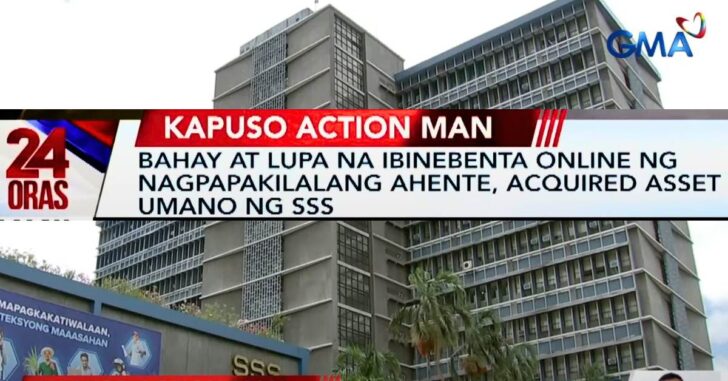
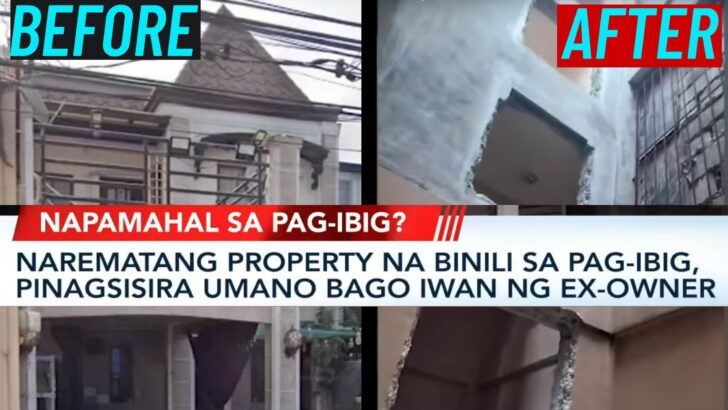
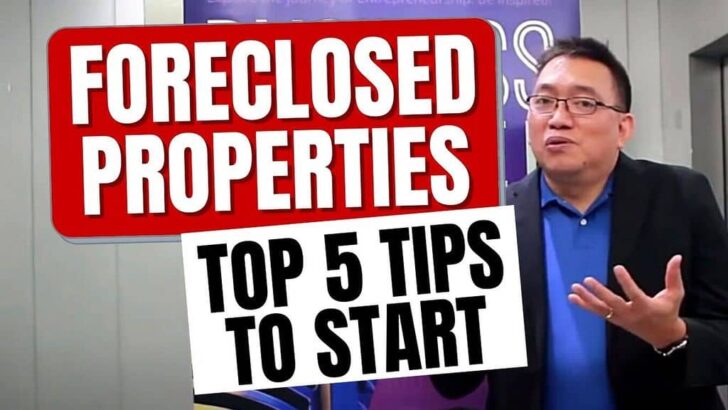
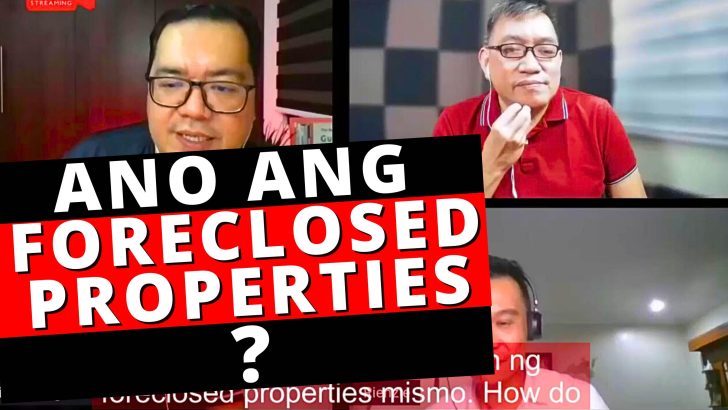
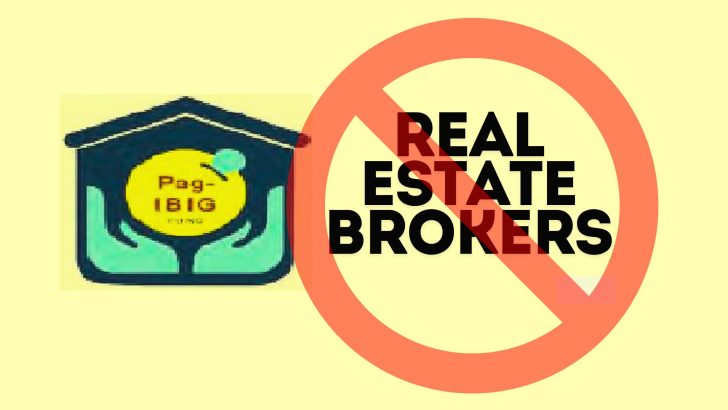
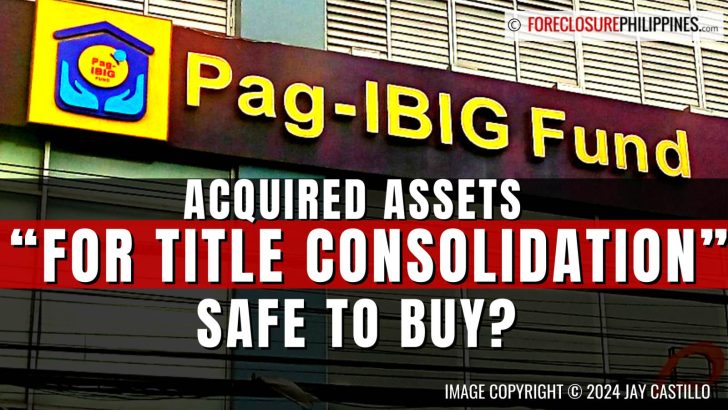
I don’t agree that your home is an asset
By definition, asset is a property that put money into your pocket, our home on the otherhand does not put money into our pocket, but instead its eating us alive through endless spending just to hold it while living in it. Our home will only be an asset if we will least it to receive rental money every month
Any property that takes money out of your pocket is a liability not an asset
Looks like you have taken to heart Robert Kiyosaki’s take on assets and liabilities, which I agree to.
But the point of my article is to treat a house as an investment, so that when you do decide to turn it into an asset that puts money in your pocket, you can do so.
I hope this article reaches a larger Pinoy audience. Educational and allow me to share 🙂
Hi Ms. Dona, thanks for the kind words! Please feel free to share, and thank you also for dropping by!
Pingback: See You At The Money Summit And Wealth Expo On July 12-13, 2013! - ForeclosurePhilippines.com
Hey, Yellow, so you are from the Philippines. I am so glad to know that. I am a Filipino too. This is what I can share to you…regarding the tips that you’re asking for:
1. Increase your investment IQ. Take the time to understand your investment options and the pros and cons of each.
Read books, take a course, see a financial planner or even consult with friends to increase your investment IQ.
2. Define your risk comfort level. Typically, the more volatile an investment is, the more profit you can make — but also the more loss you may incur.
Safer investments generally promise a specific, but more limited, return and don’t always keep pace with inflation. Deciding how much risk you are comfortable with will help you set and adhere to a smart investment course of action.
3. Match your investments to your goals. Define your short- and long-term investment goals and identify how much money you’ll need to meet those goals. Then let those goals drive your strategy.
For example, money you’ll need within five years may be invested in money-market funds, bank CDs, Treasury bills or mutual funds that buy top-rated bonds maturing in one to three years. Money you won’t need for five years or more can be invested in the growth market.
4. Don’t be guided by investment gurus. Look for funds that can withstand the test of time.
Do your own homework. Review annual and quarterly shareholder reports, along with the most recent Form 10-K or Form 10-Q disclosure documents filed with the Securities and Exchange Commission.
5. Diversify. Regardless of your personal risk profile, include a variety of assets that react differently to market conditions.
Opt for a mix of stocks, bonds and cash investments, so that when one sector of the market declines, gains in your other holdings can cushion the blow.
6. Put your investing program on automatic pilot. Treat investing as part of your basic monthly expenses.
The surest way to do this is if you don’t see the money at all before it goes from your wallet to your account. Have your employer or a mutual-fund company transfer a fixed sum every month from your salary or checking account into an investment account.
7. Stick to your investment plan. Don’t let market swings or the desire to make a sudden big purchase cause you to make impulsive decisions and alter your plan. Switching in and out of investments drives up transaction and tax costs.
Also, you’re usually selling a falling investment and buying a rising one, so you’re selling low and buying high — a sure way to lose money.
8. Reinvest your dividends whenever possible. Rather than cashing dividend checks, reinvest the proceeds.
Many companies allow you to automatically invest your payouts in additional company stock. You’ll continue to build your portfolio and you’ll save brokers’ fees and investment fees at the same time.
9. Track your investments. Make it a practice to review your goals and investments once a year. In the event your circumstances change, you also might want to revise your strategy.
10. Check with your financial consultants. Periodically meet with your CPA and other advisers to review your portfolio and allocations in light of changing goals, tax laws, investment performance and various opportunities that might arise. They also can advise you on how to time withdrawals and plan reallocations so you can make the most of your investment dollars.
I hope you find it good.
tnx for this post, your blog provides helpful information. It’s great that I happen to stumble your site..Keep this up!..I’ll surely come here more often..
Hi, I’m a Filipina migrant to NZ and I’m keen on investing on a condo (to rent out) in the Philippines. I have a particular location in mind (near UP/Ateneo area) but I don’t know where to start. Can you recommend good and reliable websites with property listings? And any tips for first time investors who are away from the Philippines like me?
Thank you very much 🙂
Hi Sir Jay,
First of all thank you for taking your time to educate everyone about foreclosures and real estate investing. Thank God I came across your blog. I was looking for foreclosed properties and I came across this site.
I want to buy my own house/condo via foreclosed properties. I have been renting for a while now and its getting wasteful because the rent im paying goes to nothing. I work in a bank and they offer a housing loan benefit – 9% p.a. interest fixed for up to 20 years.
1. I called up Metrobank to inquire about a condo unit and after getting the initial details as u advised, the Sales Officer said I can visit the unit anytime because they have possession already and the door key is with the condo admin. However when I went to the condo I found out from the condo admin that said unit is STILL OCCUPIED by former owner and they are still resolving some legal issues with Metrobank. I got really disappointed because I wasted time going there – only to find out the info Metrobank told me is inaccurate. Talaga po bang magulo kausap ang mga taga banko? I tried naman inquiring from the bank I was working for pero our sales officer appears efficient and accommodating naman.
2. I inquired about another unit and the Sales Officer immediately told me they already have an offer to buy for that property. I asked her how much the offer was – and she said its EQUAL to the selling price of the bank. Talaga bang may nag-ooffer ng ganito sa bank? Kasi ang pagkakaintindi ko, kahit noon pa at hindi ko pa nababasa yung blog nyo, when u offer to buy a bank-foreclosed asset, pwedeng pwede tawaran yan. How come meron na daw nagoffer AT selling price? Pakiramdam ko ayaw lang nya ako pansinin kasi small ticket lang naman yung gusto kong bilin hehe ?
Ano po kaya ang pwede kong gawin para “pansinin” ako ng Sales Officer ng bank nay un? Eh considered CASH naman po ang bayad ko dahil iloloan ko yun sa ibang bank, so they will be paid in full agad.
Thanks for your time po ?
Hi PFB, you’re welcome and thank you for the kind words! Wow, you have a very nice housing benefit there!
As for Metrobank, I really don’t have any first hand experience yet because most of the properties we wanted to consider in the past from them had lots of issues. I suppose hindi pa ganun kabilis sila mag update ng status ng mga foreclosed properties nila. I know how it feels when you visit a property and learn the information you got was inaccurate. I just hope they improve soon and catchup with other banks.
As to your second question, yes, as long as hindi public auction, prices are negotiable. With regards dun sa sinabi na may offer to buy na at the selling price, it may really be just that, may nag offer at their selling price, baka gustong gusto na nila yung property and they are willing to pay at full price. Don’t be discouraged by this, just move on to the next property. Just be cordial and friendly with the bank officer, madali din naman sila kausap. 🙂
This is a very enlightening post. Gradually, investor’s mindset is developing in me as I read your post. I like the thought, “You should make money when you buy, not when you sell”. We must be wise in buying properties.
Pingback: Buy income generating assets first
Pingback: Our journey to our new house – Finding a new home like true real estate investors
Pingback: Star Properties to hold The Star Auction 2009!
“Falling in love with a property can cloud one’s judgment and introduce costly improvements that one might no longer be able to recover.”
That’s so universally true, Jay. It can color one’s judgment. It’s so hard to let go of a house especially when it has become the seat of many significant memories.
But then again I’m not looking to make money on my property so it’s still okay. LOL
Hi Jan, nice to see you here. Thanks for dropping by!
I guess my suggestion would not be applicable to those houses that have become our homes and became part of our family’s heritage. Their purpose is far more than just as an investment. 🙂
Pingback: Lessons learned by a real estate broker, homeowner, and investor from Provident Village
In looking for a property we need to be wise in choosing your own home because the advantage will turn back to you. You can manage your home properly if you choose a good one.This is a good advice in looking for a nice property and get savings to your own account.
.-= office space makati´s last blog ..Contact Center Brokers =-.
Hi jay,
I was thinking of buying a house too but I was looking for foreclosed property where I can settle and also it is ready for occupancy and more cheaper I think. You only pay for like 10% of it’s price then have it mortgage.
now I like also your Idea. But you didn’t mention if the house is from a foreclosed or built from the scratch.
thanks
rommell
.-= rommell´s last blog ..Happy Wedding to ate Negie =-.
Hi Rommell,
You will have better chances of buying such a home from foreclosures or from desperate sellers. A house built from scratch, say a developer will normally be closer or even more than the fair market value.
.-= Ronald Cagape´s last blog ..Birth of an Idea =-.
Thanks again Ronald! Nice of you to drop by!
Hi Rommell, there would be a greater chance of finding good investments from foreclosed properties simply because they are cheaper. I agree with Ronald, a house built from scratch would be too expensive unless you get the land at a very cheap price(again, foreclosed land comes to mind) and if you know a good contractor that will build your house at least cost but with good quality.
Pingback: Why not treat your first home as a real estate investment …
Jay, from how I see it, most Filipinos are not really raised to see their properties as investments. In fact, most are not raised to see properties as an investment so some never had the idea of acquiring their own property even if it is a home for them to live at. Our close family ties promotes living altogether under one roof. Thus, there is no need to acquire their own properties. So I guess, this is a challenge to us who is into real estate.
By the way Jay, how would you study a property if it would produce enough cash flow to cover the monthly amortization?
Liza
Hi Liza,
That may be true for a lot of Filipinos but then if you are in Real Estate, you should not consider these as your target market. Move on to the next prospect. Being a homeowner is something that a lot of people dream of but only those who are serious about this dream can achieve it so just focus on those people who are serious about getting their own home.
Also, it’s easy to determine if a house will yield positive cashflow. The simplest formula is Cashflow = Rent – Amortization. Aim Rent >> Amortization.
.-= Ronald Cagape´s last blog ..Birth of an Idea =-.
Thanks a lot Ronald!
Hi Liza, I guess that’s the mindset most Filipinos have and the real challenge is how one can break free from this mindset. This is like a paradigm shift which doesn’t happen overnight for most people. I hope the shift has begun for you. 😉
Ronald’s formula is the simplest and easiest to use: Cashflow = Rent – Amortization. The challenge is finding properties that fetch higher rental rates than the monthly amortizations.
Pingback: Tweets that mention Why not treat your first home as a real estate investment?
Thanks Jay,
Another great post! I enjoyed reading it as it was both very light and very enlightening!
Bryan
.-= Bryan Uy´s last blog ..Investing in Your Relationships =-.
Hi Bryan, thanks for the compliment!
Jay, it was an ice breaker, It was a very good advise and
and idea. I just wondering if you know, How can I get a financial support from one Finance Company, to funded my idea of building a rented apartment in Bulacan, on my own land.
I have aready build a house and I have invested in it a huge amount of money and Now , like what you have suggested , why not let it be rented to generate income. House actual floor area is 410 square meter with 7 bedroom and 4 bathrooms.
What I want now is to build another ten stardard apartments
but I need funding, surely I can pay it on month basis. Please advise. Thanks Noel
Hi Noel, I remember someone mentioned to me that their approach was to build their multi-door apartment one unit at a time. Maybe you can follow that approach. Although I’m not sure how financing was done exactly, I can assume that the capital needed which can be through a loan for one unit would be more manageable and once the cashflow comes in, this can be saved to finance the other remaining units to be built and so on and so forth. Thanks for leaving your comment!